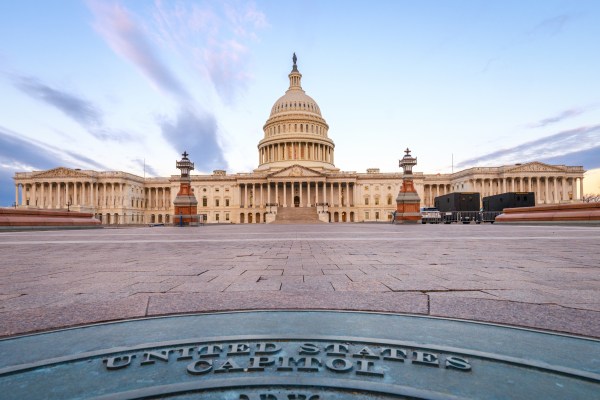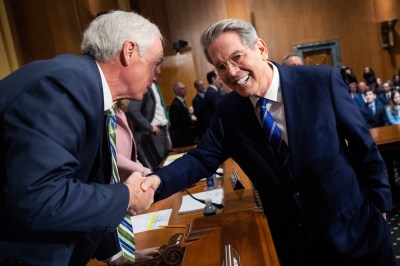There is no official deadline for congressional Republicans to pass their budget reconciliation bill to put in place President Donald Trump’s legislative agenda, but they’ve imposed one on themselves by including a debt-ceiling provision in the tax-and-spending legislation.
Despite the Treasury Department’s “extraordinary measures” to avoid a default on the United States’ $36.22 trillion in debt, Congress must once again raise the statutory debt ceiling. The last deadline, known as the “X date,” came in June 2023, when Democrats held the White House and the Senate but Republicans controlled the House. The divided government enabled Republicans to extract concessions from President Joe Biden in exchange for a suspension of the debt limit. Democrats in the Senate could do the same thing this year and threaten to filibuster a measure raising the ceiling for political leverage. To avoid that situation, Republicans included a provision in the reconciliation bill increasing the limit, which means they would not need to haggle with Democrats to raise the debt ceiling.
But putting the debt limit in the reconciliation bill also carries its own risk. Republicans need to hammer out the president’s “big, beautiful bill,” pass it through the House and Senate, and get the legislation to Trump’s desk before the X date to avoid having to make a deal with their opponents. Exactly when the government will hit the limit is unclear. It depends on several variables, such as the Treasury’s cash balance and revenues the government collects from taxes, so estimates vary. Congressional Budget Office Director Phillip Swagel said earlier this month that his scorekeeping agency placed the X date in August or September. Days later, Treasury Secretary Scott Bessent stated in a letter to Congress that it could come in August, when both chambers are scheduled to be in recess for almost the whole month. “Therefore, I respectfully urge Congress to increase or suspend the debt limit by mid-July, before its scheduled break,” he wrote.
The House and Senate each have different instructions in last month’s compromise budget resolution for increasing the debt limit in reconciliation, a discrepancy that will have to be resolved at some point. The resolution instructs the House Ways and Means Committee to raise it by $4 trillion to $40.1 trillion—which it has included in its preliminary bill text. Those same instructions tell the Senate Finance Committee to increase it by $5 trillion, though there is no bill text from the Senate yet.
Members of the House Freedom Caucus of fiscal hardliners often balk at increasing the debt limit without serious offsets. The group earlier in the year proposed raising it by $4 trillion in reconciliation so long as congressional leadership committed to “dollar-for-dollar savings over 10 years across both reconciliation bills and appropriations bills.”
The debt ceiling issue essentially gives Republicans a deadline to get their bill done. The tentative goal is for Trump to sign it by the Fourth of July, which would meet Bessent’s time frame. Still, things have a way of getting delayed in Congress. House Speaker Mike Johnson’s original plan was to pass the bill through the House by Easter and have Trump sign it by Memorial Day. Now, his goal is for the House to pass the bill by Memorial Day, and even that prospect looks far from certain. Nevertheless, Republicans in Congress last week did not project worry that the country would hit the debt limit before Trump signs the bill. For Sen. John Cornyn of Texas, a member of the Senate Finance Committee, the urgency of the debt ceiling provision could speed up the passage of the legislation.
“I think that is what's driving the train,” he told The Dispatch. “And what I would worry about if we didn't have the debt ceiling as part of [the reconciliation bill] is we'd kick it down the road, and we’d be [in] September, October, and then we'd find ourselves up against a wall in December, so I think this is going to be a July exercise. I don't know what the leadership is planning, but it seemed to me that if you back this up against the August recess, that's an ideal time to get it all done.”
Republicans in the House are battling over what measures to put into the reconciliation bill, such as Medicaid reforms and an increase to the state and local tax deduction, which has delayed progress on its passage. Those struggles came to a head Friday when deficit hawks on the Budget Committee voted with Democrats to tank it and stop the panel from advancing it to the whole chamber. The committee eventually approved the bill Sunday evening but only because those previous Republican dissenters switched their “no” votes to “present.”
Leading up to the Friday vote, some House GOP leaders reportedly argued to holdouts that they would need to strike a deal with Democrats if they did not raise the debt ceiling in a party-line bill. Prior to the vote, Rep. Ralph Norman of South Carolina, a holdout on the committee, said he had not discussed the debt ceiling but said the X date is “a consideration” regarding his vote on the bill.
“We want to give the president what he needs, and I trust him on it, but the devil is in the details on this stuff,” he told The Dispatch. Norman was one of about three dozen Republican House members who voted against a continuing resolution that raised the debt limit without significant cuts toward the end of last year.
Once again, House Republicans must take into account the demands of spending hawks and others as they try to craft their reconciliation bill while the country hurdles toward its debt ceiling. The GOP conference already has to “thread a very careful needle,” in the words of tax committee chairman Rep. Jason Smith of Missouri, between the factions—hence the delay. Change something to satisfy the fiscal hardliners, and you’ll displease the moderates. But the Senate also will have a say in the final version of the bill.
Even now, multiple Republican senators have pledged to vote against the bill in its current form. As Friday’s Morning Dispatch detailed, Sen. Josh Hawley of Missouri objected to some of the Medicaid provisions, while Sen. Ron Johnson of Wisconsin said it did not cut enough spending. That will require an entirely new song and dance as the Senate makes changes that the House will need to approve. Whether they can do it all before the August recess—and the looming X date—is an open question.
Sen. Johnson noted that he has never voted to raise the debt ceiling but supports it now to avoid a default while Republicans enact their tax priorities and “get spending down to reasonable, pre-pandemic levels.” Asked about the timing of the X date, Johnson told The Dispatch he still favored splitting the package into multiple bills, something that GOP senators had advocated earlier in the process.
“We're going to have to do it through reconciliation,” he said of raising the debt ceiling, “so that's why I've always thought I'd like to decouple the big, beautiful bill into three separate—and I'm still recommending it. I'm pushing it right now.”







Please note that we at The Dispatch hold ourselves, our work, and our commenters to a higher standard than other places on the internet. We welcome comments that foster genuine debate or discussion—including comments critical of us or our work—but responses that include ad hominem attacks on fellow Dispatch members or are intended to stoke fear and anger may be moderated.
With your membership, you only have the ability to comment on The Morning Dispatch articles. Consider upgrading to join the conversation everywhere.